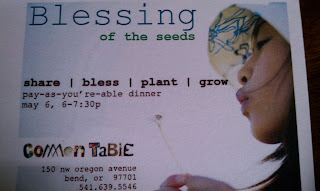Wednesday, May 2, 2012
Oregonizing for Mission
Here at Sunriver Resort near Bend, Oregon I am surrounded by my Christian brothers and sisters at the Lutheran 2012 synod assembly.
I wonder if you just quit reading. I wonder if a limited, stereotypical definition of Christians turned you away after my first sentence. I dare you to keep reading. If you do, I pray your vision of Christianity will be changed forever and you'll join us in knocking down borders as we reach through communities forming partnerships, non-denominational, unplanned, unpredictable, across all levels of diversity including income, culture, language, gender, and age.
In less than 24 hours I've learned that many of our Lutheran churches share a pastor with other denominations, especially in rural places or places of smaller congregations: Methodist, Presbyterian, Episcopal, and those less known. The stories I've heard confirm our guest speaker's theory that this is the new direction of Christianity. Barbara Rossing, Th.D., professor of New Testament at the Lutheran School of Theology at Chicago, talks about rubbing shoulders with those different than us, seeing God's face in the the face of another, needing the story of someone else to complete our own story, and renewing abundant life in our local communities.
Nativity Lutheran in Bend, Oregon had homeless people living in tents on their adjacent property. Their pastors were away at a conference in Mexico learning about homeless issues, when in the middle of winter, members of this congregation invited these people into their church to stay warm. Now, several churches in the area alternate as a warm place to stay for the homeless in the area. Nativity has a community garden where these and many others in the community learn and grow together providing food for themselves, the local food bank, and their non-profit restaurant, Common Table, where everyone eats fresh and healthy food whether one can pay for it or not . Common Table not only provides food. On the walls are stories of detained immigrants written by members of the local Presbyterian Church. I was shocked to learn a green card can cost from $3000.-$10, 000 and still not be definitive for US citizenship. Each letter of the sign, Common Table, was created by a different artist. The work of local artists is displayed and changed weekly. A paying bar, tokens for giving others a meal, library, and stack of games add are other welcoming touches to the cafe.
Nativity has also built a community memorial garden where the ashes of loved ones and pets may be memorialized with plants, trees, benches, and peace. A beautiful natural landscape includes a labyrinth and a fence to keep the surrounding deer at bay. Anyone is welcome to come and sit, walk the labyrinth, or meditate in the peace of the sage brush, juniper trees, and plantings. A beautifully carved juniper cross greets you as you enter the gateway.
Nativity has also opened their doors to the local head start program. The wee ones not only share space with the church and community members, they benefit from the learning gardens, start their own seedlings in the two recently donated green houses, and frolic on two playgrounds built on the premises.
Across from the gardens is a wood cutting and chipping area. Members of the community donate wood. This deposit provides fire wood for anyone in need. Many people here heat their homes with wood. Those needing wood come to split wood, load wood for others and get a chord supply for 15-20 dollars. The receivers enjoy the benefit of giving to others and a cost saving of over $100.00 for their fuel supply.
Making this situation even more unique, the church members do all this on joint property with a wealthy resident. He is supporting the church to support the community by offering his land for additional garden plots, the wood chipping area, and meditation garden. The day we visited two volunteers were planting and maintaining the memorial garden and several people came by to check on their garden plots. Once known as the "little white church on the way to the garbage dump" Nativity is now known for their hospitality and reflection of God's love.
In Heppner, Oregon congregations join to provide care and lunches for students on Fridays. School has always been out on Fridays there. Their was a need for day care and lunch for the students of working parents; the church fills the need and offers a curriculum of morality and spirituality to those who come. Far from a Sunday School offered during the sermon, this reaching to meet the community, breaking out the church walls, joining together in partnership is the new church direction. Throughout the weekend, I heard story after story about the work of churches in the Oregon Synod and it made me feel blessed to be touched by God's grace.
Christians have always reached out to their communities but usually to bring people to Christ, not necessarily to bring Christ's love to others. It's time for us to do more than talk about faith in action. Mark Hanson, presiding bishop says, " We are called to be engaged in God's work of healing and restoring community in the world through love and service." I believe Oregonizing for Mission is our calling.
In the past few years the title of Christian has become synonymous with religious fanatic, unbending, and judgmental. This is not the Christian I see. I see people who unselfishly open their doors, and lives, and resources to help others in need. People breaking down barriers and spreading love. People who are committed to making the world a better place of all of us. People providing a Common Table for all to share.
Subscribe to:
Comments (Atom)





